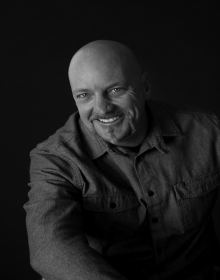“Detestation of the high is the involuntary homage of the low.”
- Charles Dickens
David and Goliath are at it again. This time, they are playing out the roles of underdog and oppressor on the unlikeliest of proverbial battlegrounds — the Park Hill Golf Course.
This classic duel has been staged across the Mile High City for decades: A large developer with deep pockets acquires valuable real estate. Then, they set out to build upon the property in dimensions that do not resonate with longtime residents of the surrounding community. Most often, the neighborhood stakeholders lose, but this time the big dog has a hitch in its get-along — a handicap — if you will.
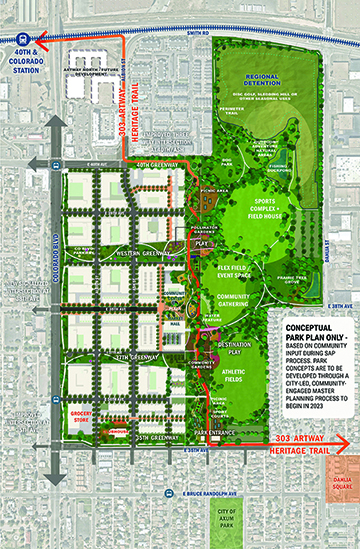
Bird’s Eye View: This is the purported long-term development of the Park Hill Golf Course plan presented by Westside Investment Partners. Critics indicate there will be nothing to stop Westside from turning the rest of the open space into high density units. Image courtesy of Westside Investment Partners and The Holleran Group
Currently the 155-acre Park Hill Golf Course (PHGC) is encumbered by a perpetual conservation easement which, according to the assigned legalese, “Limits use of the property to open space in general and a golf course in particular.”
From the early 1980s until recently, the PHGC was privately owned by the Clayton Foundation. In 2019, Westside Investment Partners purchased the property at a total price tag of $24M. In addition to the conservation easement, the Glendale-based developer faces another obstacle; an organization called Save Open Space (SOS) Denver. Their website states they are, “A grassroots community group focused on the future of the Park Hill Golf Course land.”
Silence The Protestors
SOS Denver spokesperson Harry Doby is deeply immersed in the fight to preserve the massive stretch of grass and trees adjacent to his home. Yet, Doby and his fellow SOS members have faced staunch opposition from the City of Denver. Recently, a comprehensive protest petition signed by adjacent property owners and businesses against rezoning of the land was rejected by city officials, despite the fact that Doby and company followed all rules for filing described on the city’s website. When questioned, the city stood by their rejection of the petition, stating in vague language via email that th
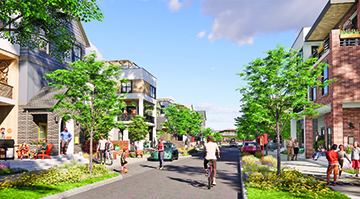
Rendering: Developers present idyllic artist renderings of what the project might look like upon completion. Denverites are skeptical as often the actual finished project is much different than the rendering submitted by Westside. Image courtesy of Westside Investment Partners and The Holleran Group
e documents provided did not meet the legal requirements. “They invented this rule simply to stop our process,” says Doby. “The city has a single-minded obsession with developing this green space. Westside knew going in they had no development rights.”
As a result of ousting the voices of local property owners and businesses, Denver City Council cast a majority vote of 11-2 to place the issue on the April 4th Election Ballot. Now, the decision whether to lift the conservation easement is going to be left up to Denver voters at large under Proposition 2-0.
Grease The Wheels
A city-wide vote on the fate of PHGC is troubling for Doby and other Park Hill residents, as it could allow Westside Investment Partners to cast a citywide net of influence in order to sway the vote in their favor. Doby and his colleagues at SOS Denver anticipate exactly this. “The $24M [PHGC purchase price] is a drop in the bucket for them,” Doby says. “A multi-million dollar ad campaign is another drop in the bucket.”
Westside has made a well-documented series of generous donations to Mayor Hancock’s administration as well as to the majority of city council members. In a January 23 article, Denverite reported, “The company [Westside] and its entities and staff have made over $41,000 in political contributi
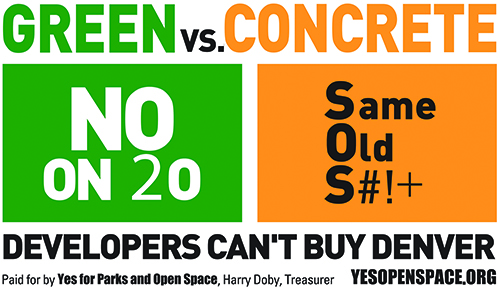
Civic Group: Yes for Park and Open Space aims to stop the development of Park Hill Golf Course. Image courtesy of Harry Doby
ons to Denver City Council members and the mayor since 2017.”
The First Salvo
In response to the April 4th ballot measure, Doby and his SOS Denver colleagues formed Yes for Parks and Open Space, anchored on the slogan “No On 2-O.” Doby continues, “We are in a climate crisis, we are on a heat island. Preserving the green space is to our health and environmental benefit. There is development happening around Park Hill Golf Course as we speak, including affordable housing. There’s a project at 38th and Holly that is going to build 253 affordable apartments and townhomes. Therefore, it would be squandering our limited resources. You can replace green space, but you can replace warehouses with housing. The smart place to build is redeveloping dilapidated commercial and industrial properties.”
A Daunting Retort
Not to be outmaneuvered, Westside quickly rolled out a supporting initiative of their own, the similarly-branded Yes for Parks and Homes. A thorough, impressive, and artfully rendered presentation deck lays out a dazzling array of development benefits. Features include the 303 ArtWay Heritage Trail, a grocery store, rail and bus transit access, the city’s fourth-largest regional park, a community center and 2,500 new homes — including
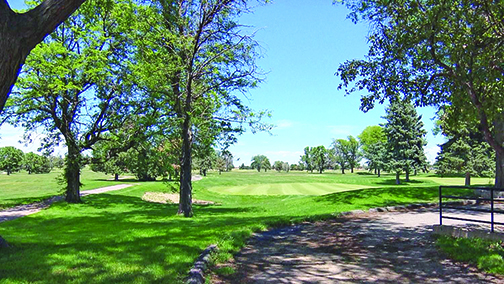
Upcoming Election: Park Hill Golf Course has been an oasis in urban Denver since 1930. It will cease to be if Westside Investment Partners can get voters to approve its development plan on the April 4 election.
rental and for-sale housing. The language leans heavily on the “affordable housing” theme, while providing rendered images of a utopia-like urban paradise of grassy recreation areas, food truck gatherings, spacious pathways for bikes and pedestrians, playgrounds, basketball courts, outdoor seating areas, retail storefronts, and modern multi-level housing structures. The “Why We’re Here” section cites a “City-wide shortage of high-quality affordable housing.” Meanwhile, the “Binding Commitments” section cites that over 100 of the 155 total acres will be, “Conveyed to the city for parks and open space.”
Organizational Support
Additionally, Yes for Parks and Homes boasts a bevy of high-profile endorsements from organizations such as Habitat for Humanity, Black Business Initiative, YIMBY Denver, Volunteers of America, and many more. Company principal Kenneth Ho brings an impressive resume to the table, having served as the former chair of the Denver Planning Commission with an MBA and a master’s in urban planning. Ho is quick to emphasize Westside’s commitment to preserving a large portion of the natural grounds. “We recognize the need for open space, that is why we’ve got more than 100 acres here,” he says. “We also know that we need to have affordable housing in this region. We need to have places that foster community, and we need to have access to fresh food and economic opportunity. That’s why, when it comes down to it, this is about a ‘both and’ versus a ‘neither nor’ situation.”
Something For Everyone
Westside’s plan includes a “Guaranteed Affordability” section based on Denver’s Area Median Income (AMI). Provisions include 25% of the development’s total residential properties for “deeply affordable housing options,” and “at least 550 permanently affordable units split between rental and for-sale Income Restricted Units (IRUs),” as well as 300 entry-level homes, 60 IRUs for senior housing, 40 units for permanent supportive housing, and at least 150 IRUs for family housing.
Westside emphasizes the immediate need for affordable housing in Denver, yet the timeline on delivery of their contribution to this need is vague. “It will probably be in three phases starting from the south to the north,” says Ho. “It’s hard to predict how the City and County of Denver approves plans and gets building permits out, so we anticipate that it would probably be three to five years.” This projection is for the first phase only, leaving prediction of subsequent phase completion up to speculation. Based on the above guess, however, completion of the project could take up to 15 years.
An Outspoken Ally
While Westside’s development proposal is alluring in its current digital form, the long-term layout is cause for more immediate concern. Lifetime Park Hill resident, activist and community leader Terr
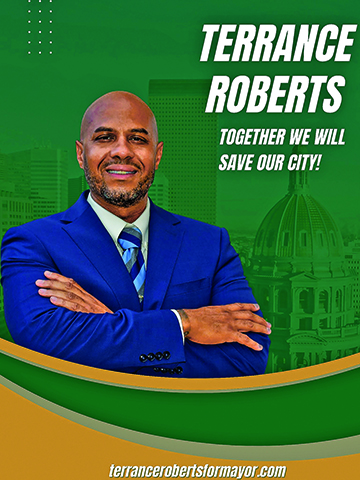
Mayoral Candidate: Denver Mayoral candidate and lifelong resident of Park Hill, Terrance Roberts, has some definitive opinions on Westside’s development plan. Image courtesy of Terrance Roberts for Mayor
ance Roberts — who is also a candidate in the 2023 Mayoral race — has a few homegrown observations on the matter. “For someone who doesn’t understand the area, like someone from Regis or Cherry Creek, these drawings look pretty darn good,” he begins. “Developers keep using the ‘affordable housing’ term but it’s deceptive. Affordable for who? We don’t need that, we need public housing. We are already dealing with gentrification, and many of these so-called ‘affordable housing’ units stay empty. Plus, if something has already been designated as open space, why are you ramming through a development plan?”
Roberts is also quick to point out the imprudence of putting the fate of Park Hill Golf Course on the April 4th ballot, as it is a hyper-localized issue which is largely irrelevant to people other than Park Hill residents. “I don’t think it should be a city-wide vote because that is just a tactic. Most Park Hill residents won’t go for it,” he says. “The fact that they knew there was an easement in place and they purchased it anyways means they are used to pushing developments through government channels and getting their way. This whole process is very condescending to people in Park Hill. The majority of residents in this district have already said no to this. Plus, there’s already a development at 38th and Holly.”
Final Positions
Regardless, Westside is committed to the merits of their vision and convinced they will be successful at the polls on April 4th. Company spokesperson Bill Rigler of Greenlight Strategy declines to comment on what may become of Westside’s $24M purchase should Denver voters say no to the lifting of the conservation easement. “Westside has spent over four years developing this plan and proposal,” he says. “We are more excited and focused on what that proposal for action is, especially after having received 11-2 approval from City Council to put this on the ballot.”
Doby, SOS Denver, and Yes for Parks and Open Space are similarly confident. In a recent Denver 7 News interview, Doby attests, “We’re going to win, it’s just a matter of time. The Park Hill neighborhood and Denver in general know that this is a rotten deal, they are being sold a bill of goods, and they are not going to stand for it.”

